You want to learn Python but don’t know where to start.
With so many resources, tutorials, and courses available it can be hard to know which is the best way for you to learn Python.
We’ve created a guide that takes you through everything from learning the basics of Python syntax.
Best Ways to Learn Python
There are many ways to learn Python, and finding the best way for you will depend on your learning style and goals. Some people prefer to learn by following tutorial videos, while others prefer to read books or take an online course.
If you want to learn Python quickly, the best way is to find a comprehensive guide that covers all the basics and then start practicing by coding small projects. Once you have a good understanding of the language, you can begin working on larger projects.
It’s also important to join the Python community and participate in online forums so that you can ask questions and get feedback from experienced developers. By taking advantage of all these resources, you can quickly become proficient in Python.
Learning Resources for Beginner Python Programmers
Python is a programming language with many characteristics, such as an intuitive syntax and powerful data structures, which can lead to efficient code. It’s no wonder that this, as well as experienced developers, are benefitting.
Although there are different ways to learn the Python programming language. The three most common ways are taking classes online or in-person, working with a tutor, or learning on your own through resources such as books or websites.
Each of these has its own set of advantages and disadvantages that should be considered before making a decision.
For example, online classes offer the benefit of being able to learn at your own pace and having access to course material at any time. However, they can also be expensive and you may not have the same interaction with the instructor and other students as you would in a traditional classroom setting.
On the other hand, working with a tutor can be more expensive than learning on your own but offers the advantage of one-on-one attention from an experienced Python programmer.
If you decide to learn on your own, there are many resources available that can be helpful, such as books, websites, and online courses. However, it is important to make sure that you find a resource that covers all the basics so that you can learn the language quickly and effectively.
Now that we’ve answered some of the most frequently asked questions about learning the Python language, let’s take a look at some resources that can help you get started.
Interactive Courses
If you learn best by interacting with the material and practicing as you go, then paid or free online courses might be the right choice for you. Check out these options:
Complete Python Bootcamp: Go From Zero to Hero in Python 3 on Udemy

One of the more popular online Python courses on Udemy covers the basics of Python 3. It has homework, quizzes, notes, and 3 major projects so you have a portfolio of projects when you complete the course.
Programming In Python For Beginners

This course takes the student from knowing nothing about programming – it includes a step-by-step guide to setting up your development environment and installing Python and then proceeds to teach the basics of the language. There are 11 hours of video that covers all the basics and advanced topics such as performance testing.
The Python Mega Course: Build 10 Real World Applications

This course follows my favorite way of learning information – by doing! It will take you from beginner to having 10 apps to show off – including a mobile app, desktop applications, web scrapers, a CSV processor, and a personal website. As a first or second course, this is a winner.
Python Fundamentals on Pluralsight
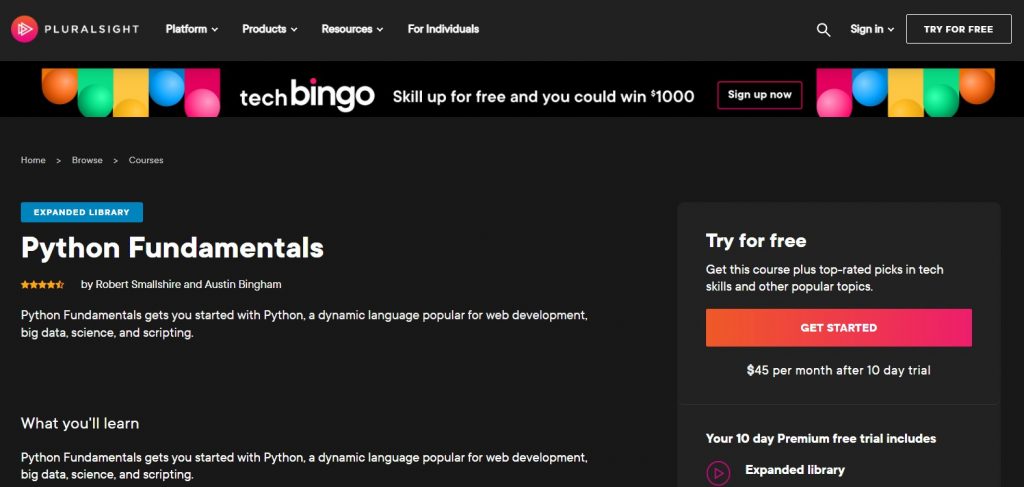
This course is fun and starts you out from ground zero. Taught by an engaging instructor, it covers all the basics of Python programming and gets you started with some coding challenges.
Books
If you’re a more traditional learner who prefers to read and work through examples on your own, then these books might be right for you.
Python Crash Course
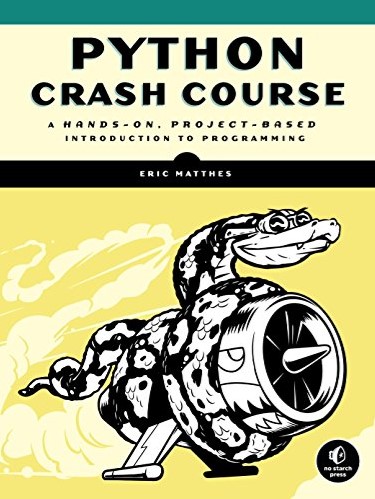
This book is great for beginners who want to learn Python quickly. It covers all the basics of the language including python string manipulation, python data structures, and includes exercises so that you can practice what you’ve learned.
Automate the Boring Stuff with Python
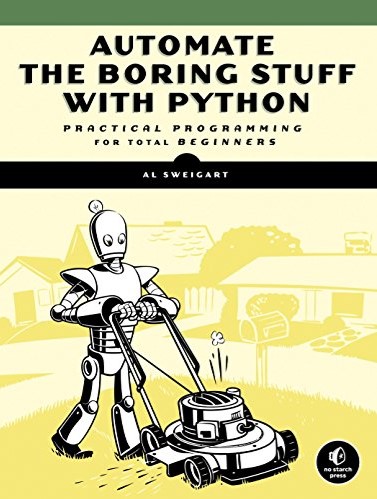
This book is perfect for someone who wants to learn Python in order to automate tasks. It covers the basics of the language and then moves on to more advanced topics such as working with PDFs, Excel spreadsheets, and Word documents.
Learning Python
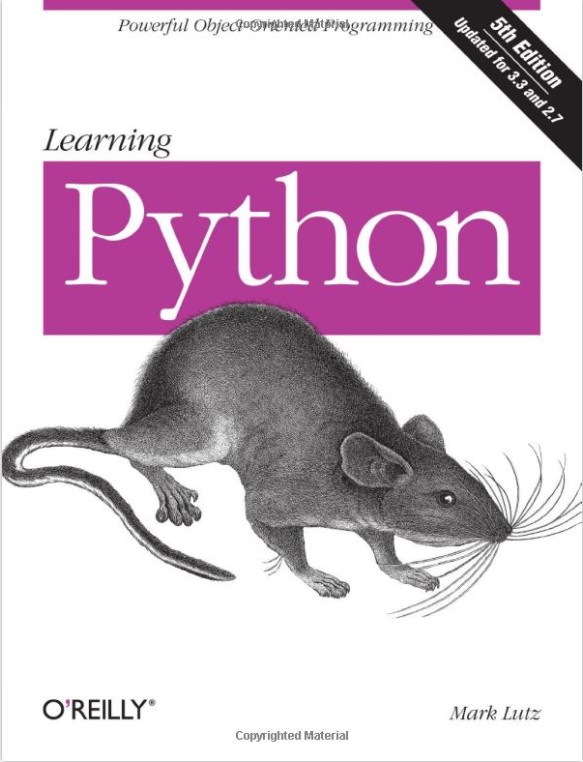
This is considered the Bible for learning Python and is a great resource for both beginners and experienced programmers. It covers all the basics of the language and then moves on to more advanced topics such as object-oriented programming.
Learn Python 3 The Hard Way
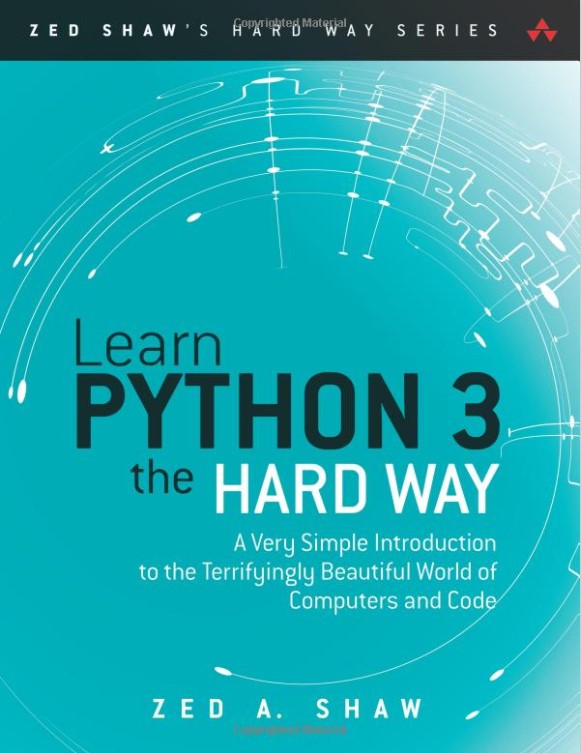
This is a great book for those who want to learn Python 3. It starts with the basics of the language and moves on to more advanced topics such as object-oriented programming.
A Byte of Python
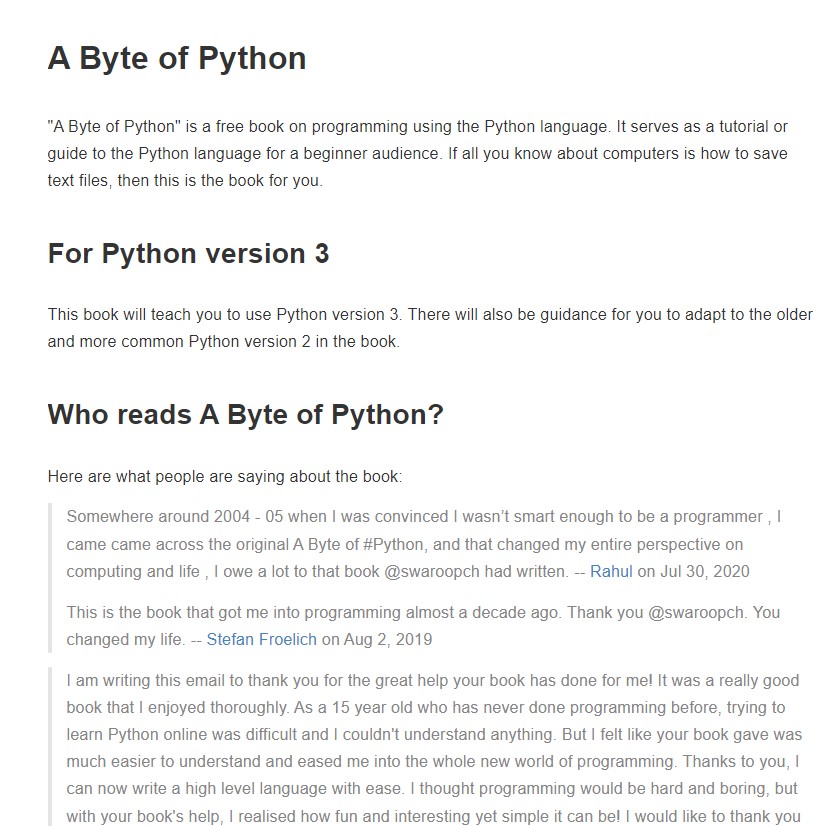
This is a great book for beginners who want to learn Python from scratch. It covers all the basics of the language in a clear and concise way and includes exercises so that you can practice writing Python code you’ve learned as you go. It’s also free.
Learning with Python: How to Think Like a Computer Scientist
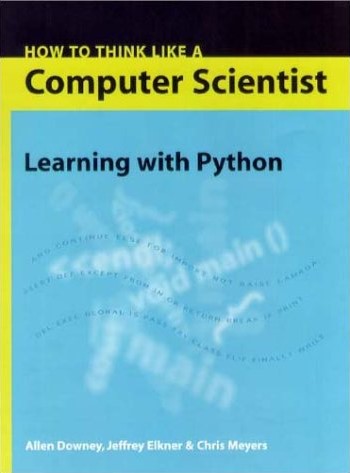
Another free book, which covers a lot of real-world problems. It’s perfect for those who want to understand how computer science concepts can be applied to Python programming.
Tutorials
If you prefer to learn by working through tutorials, then these might be right for you.
Python Tutorial for Beginners on Python.com
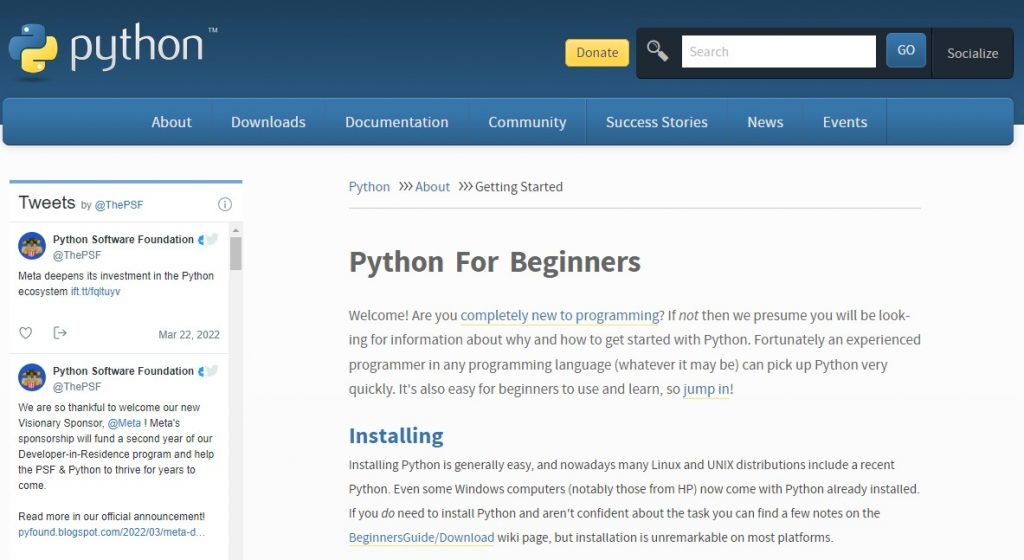
This is a great tutorial from the Python foundation itself that covers all the basics of Python programming.
Interactive Python Tutorial on LearnPython.com
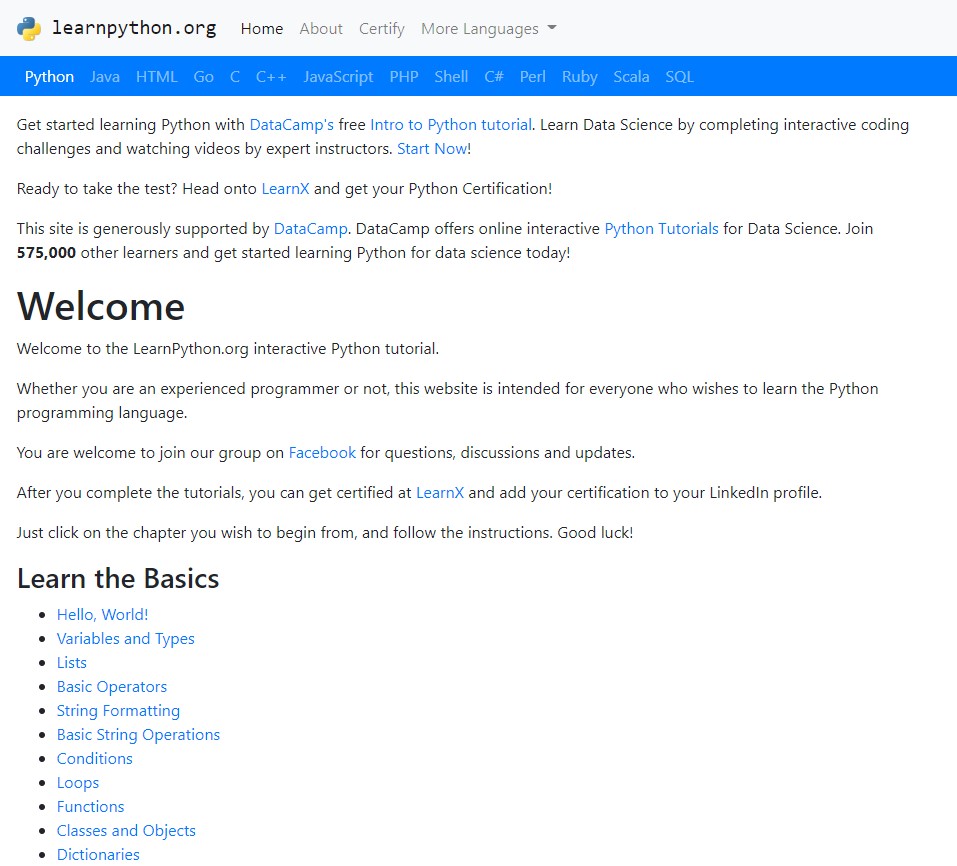
This is a great interactive class for those who want to learn Python from scratch.
Python Tutorial from W3Schools
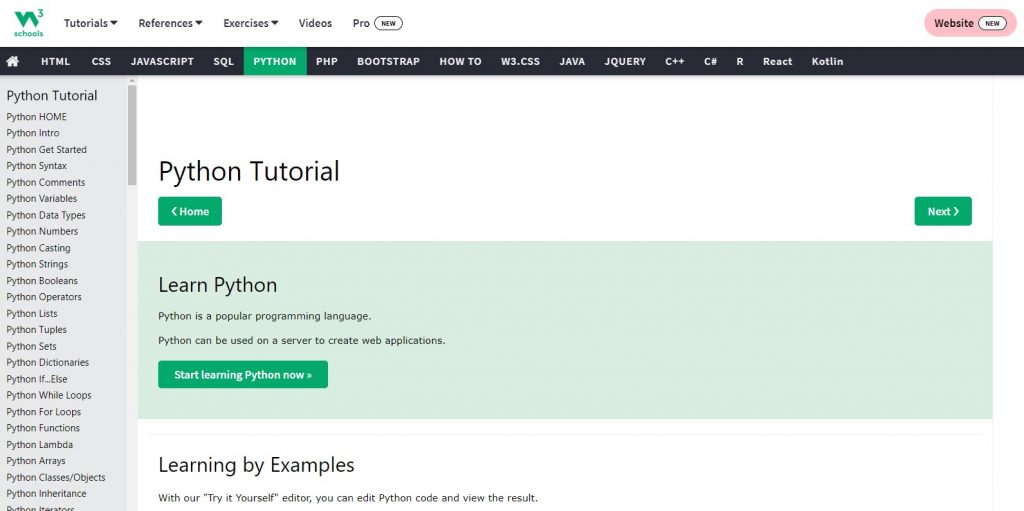
This tutorial is aimed at experienced programmers who want to learn Python. It starts with the basics of the language and moves on to more advanced topics such as object-oriented programming.
Video Tutorials
If you’re a visual learner or you want to be able to reference the material later, then video tutorials might be the right fit for you. These are some of our favorites:
Learn Python Full Course for Beginners from freeCodeCamp.org
This is a great beginner’s course that covers all the basics of Python programming.
Python Tutorial Python Full Course for Beginners
This is a fantastic resource that includes video lectures, exercises, and code samples. It also includes web development and machine learning projects.
Python Tutorial for Beginners Learn Python in 5 Hours
This is a great series of videos for those who want to learn Python from scratch. It also takes you through setting up PyCharm (which is my development environment of choice).
Once you have the basics down, it’s simply a matter of practice and expanding your knowledge by exploring new concepts and modules. Of course, some people will learn faster than others, but if you’re dedicated to learning Python, you can definitely become proficient in a matter of months.
Challenges and Projects for Beginners
Once you have chosen a learning method, the next step is to start practicing by coding small projects. This will help you to apply the concepts you have learned and to see how they work in a real-world setting.
One way to find ideas for projects is to look at the challenges that are available online. These are typically small tasks that you can complete in a few hours, such as writing a program to convert temperatures from Celsius to Fahrenheit. By working on these challenges, you will improve your Python skills and be better prepared to tackle larger projects.
Another option for finding project ideas is to look for open source projects that need help. This is a great way to contribute to a real project while also learning more about Python. To find projects that need help, you can search online or ask in Python forums. Once you find them, you can look for tags on issues or bugs that are flagged “First Issue”, “Begin Here”, or something similar.
Once you have completed a few projects, you will have a better understanding of how to use Python and you will be able to tackle more complex tasks. As you continue to learn and grow as a programmer, you will find that Python is an incredibly powerful and versatile language that can be used for a wide variety of purposes.
Projects
Once you’ve learned the basics of the Python programming language, you can start working on Python projects to practice what you’ve learned. These are some great starter projects to produce some Python code.
- Build a Calculator: This project will walk you through the process of building a simple calculator with Python.
- Design a Game: This project will show you how to design a simple game with the Python language.
- Create a Basic Web Page: This project will teach you how to create a basic web page using Python.
You can also check out my blog post on project ideas.
Challenges
If you’re looking for some challenges to help you practice your Python skills, here are some ideas:
- Create a Quiz: This challenge will walk you through the process of creating a quiz with the Python programming language.
- Build a Mad Libs Game: This challenge will show you how to build a Mad Libs game with Python.
- Create a Tic Tac Toe Game: This challenge will teach you how to create a Tic Tac Toe game with Python.
Of course, these are just a few ideas to get you started. Once you have completed a few projects, you will have a better understanding of how to use Python and you will be able to tackle more complex tasks. As you continue to learn and grow as a programmer, you will find that Python is an incredibly powerful and versatile language that can be used for a wide variety of purposes.
Advanced Resources and Tutorials
Python is a versatile language that you can use on the backend, frontend, or full stack of a web application. Python is also great for scientific computing, data analysis, artificial intelligence, and more. So, once you have the basics, there are many different directions you can go to increase your knowledge.
There are many resources available for learning advanced Python concepts. If you want to learn about a specific topic, you can search for tutorials or video courses online. Alternatively, if you want to learn about multiple topics, you can find books that cover various aspects of the language.
Some popular topics that you might want to explore include web development, scientific computing, data analysis, artificial intelligence, and more.
No matter what your goals are, with a little effort, you can find the resources you need to learn advanced Python concepts and take your skills to the next level.
Introduction to Machine Learning with Python A Guide for Data Scientists
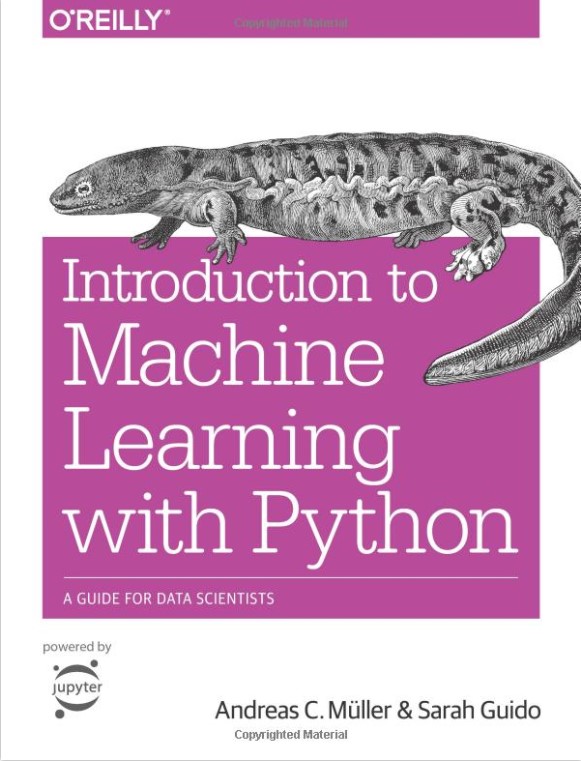
Introduction to Machine Learning with Python covers the machine learning aspect of using Python. Many software programs are using AI and machine learning. Here’s your entry to that world.
Fluent Python – Clear, Concise, and Effective Programming
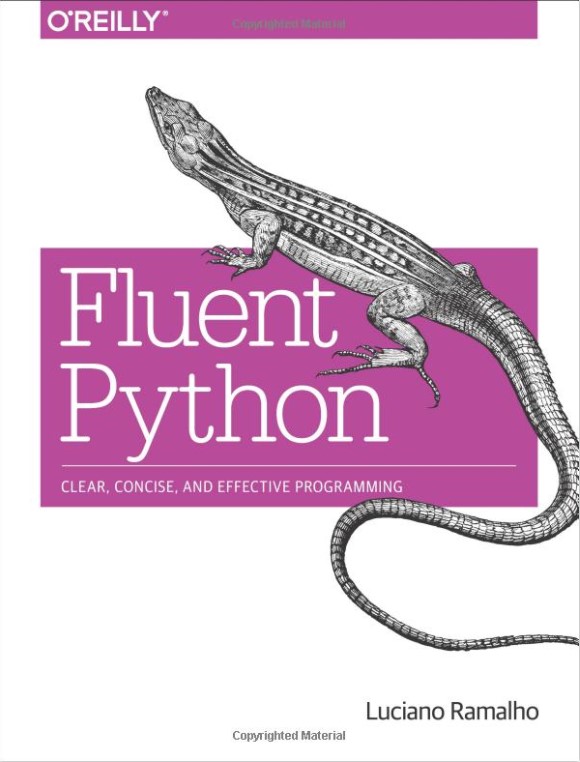
Fluent Python dives into some of the more esoteric and less well known areas of Python to enable you to have a leg up on other developers and help you stand out in the job market.
Wrapping Up
Whether you want to use Python for web development, scientific computing, data analysis, artificial intelligence, or something else entirely, it is important to choose the right learning method and resources so that you can get the most out of the language.
Remember that the best way to learn Python is by doing. So, once you have chosen a learning method, make sure to start coding small projects to apply the concepts you have learned. And, as you become more experienced, you can explore advanced topics to take your skills to the next level.
FAQ
What is the Python Programming Language?
Learning a new programming language can be daunting, but with the right approach, it can also be exciting and rewarding. Python is a versatile language that can be used for everything from web development to data science, and it is relatively easy to learn compared to other languages.
The best way to learn Python depends on your level of experience and what you hope to use it for. If you are starting from scratch, it might be a good idea to take an online course or follow a tutorial. Once you have some basic knowledge, you can practice by working on small projects or participating in online forums. If you want to use Python for professional purposes, it is important to get involved in the community and attend conferences and meetups. By taking advantage of the resources available, you can set yourself up for success and become a proficient Python programmer.
Guido van Rossum began work on Python in the late 1980s at Centrum Wiskunde & Informatica (CWI, Center for Mathematics and Computer Science) in the Netherlands as a replacement for the ABC language (which was influenced by SETL) with exception handling and interfaces to Amoeba. In December 1989, the Python project was formed. Python’s creator, Van Rossum, is the project’s primary author, and his continuing major involvement in Python’s future direction is reflected in the title bestowed on him by the community: Benevolent Dictator For Life (BDFL).
As of January 2020, CPython, the reference implementation of Python 3, is ranked first among all programming languages with a TIOBE index rating of 10.0%.
Why Learn Python?
Python is a versatile language that you can use on the backend, frontend, or full stack of a web application. Python is also relatively simple to learn compared to other languages. In fact, one of its popular nicknames is “executable pseudocode” because it is easy to read and write. Python’s syntax is also very uniform which makes it easy to follow.
Additionally, Python has a very large and supportive community which can be extremely helpful when you are learning the language or encounter any issues. Large companies such as Google, Yahoo!, Disney, and IBM use Python in some capacity which means there are plenty of job opportunities available if you know the language. Overall, learning Python can be extremely beneficial whether you want to use it for personal or professional purposes.
Python is an unambiguous, easy-to-read, general-purpose high-level programming language that considers paradigms of structured, procedural, and object-oriented programming. According to the creator, Guido van Rossum, Python aims to combine “remarkable power with the very clear syntax”. Its standard library is large and comprehensive. The prominent use of a lot of whitespaces and its design principle of code maintainability and readability reflect its emphasis on write-once, run-anywhere applications.
It also offers structural elements that allow for simple programming on both tiny and huge scales.
Python code features a dynamic type system and automatic memory management. It supports multiple programming paradigms, including structured (particularly, procedural), object-oriented, and functional programming. Python is often described as a “batteries included” language due to its comprehensive standard library.
Is It Worth Learning Python in 2022?
Python has been one of the most popular programming languages for several years now, and there are no signs of its popularity slowing down. According to the TIOBE Index, Python is currently the third most popular language, behind only Java and C.
Moreover, Python is used by some of the biggest tech companies in the world, including Google, Facebook, and Netflix. So, if you’re wondering whether Python is worth learning in 2022, the answer is a resounding yes!
Not only is Python extremely versatile and in high demand, but it’s also relatively easy to learn compared to other languages. Plus, with the rise of data science, AI, and machine learning, demand for Python developers is only going to increase in the coming years. So if you’re looking for a language that will keep you in high demand and give you the opportunity to work with some of the biggest tech companies in the world, Python is one of the top programming languages.
How Long Does it Take to Learn Python Compared to Other Programming Languages?
How long does it take to learn Python is a difficult question to answer because it depends on your prior experience and how much time you’re willing to devote to learning the language.
However, most people report being able to learn the basics of Python in a matter of weeks. Once you have the basics down, it’s simply a matter of practice and expanding your knowledge by exploring new concepts and modules. Of course, some people will learn faster than others, but if you’re dedicated to learning Python, you can definitely become proficient in a matter of months. It really is one of the easiest programming languages to learn.
What is the Easiest Way to Learn Python?
There is no single “easiest” way to learn Python because everyone learns differently. However, some people find that they learn best by watching video tutorials or reading books, while others prefer interactive courses where they can practice coding along with the instructor.
Whichever method you choose, make sure you find materials that are suited to your learning style so that you can get the most out of them. Additionally, it’s always helpful to find a friend or colleague who is also learning Python so that you can practice together and help each other out when needed.
Is Python Easier to Learn Than C++?
This is a difficult question to answer because both languages have their own unique syntax and quirks. However, many people find Python to be more forgiving than C++ because it is not as strict about syntax.
Additionally, Python features dynamic typing, which means that you don’t have to declare variables in advance, making it easier to get started with coding. So, while both languages have their own challenges, Python may be easier for beginners to learn.
Shouldn’t I learn a ‘true’ Object Oriented Programming Language?
If you want to learn Object-Oriented Programming (OOP), Python is a great choice. While it is not a pure OOP language like Java or other programming languages, it does support most OOP concepts, such as inheritance and polymorphism.
Additionally, many experienced developers find Python’s approach to OOP to be more intuitive and easier to learn than other languages. So, if you’re interested in learning OOP, Python is definitely worth considering.
